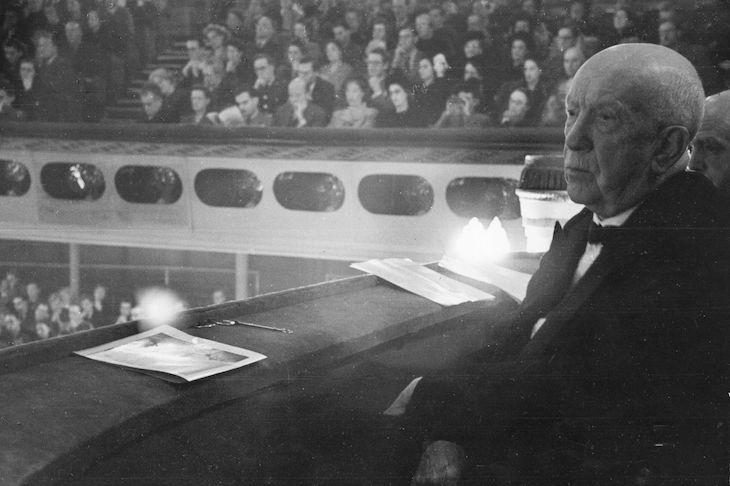An opera without singers, a Strauss orchestra of just 16, and an early music ensemble playing Mahler: welcome to the Oxford Lieder Festival, where familiar repertoire is getting a reboot this year thanks to some brilliantly ambitious programming.
When it comes to classical music, we’re used to living in a bifurcated world. On the one hand, you have the contemporary ensembles: the orchestras, choirs and quartets performing pretty much everything from Mozart onwards. And on the other the early music groups, whose territory is everything that’s left — Bach, Byrd, Hildegard of Bingen.
It’s only fairly recently, and thanks to groups such as the Orchestra of the Age of Enlightenment, that this crude, artificial divide has been challenged. Symphony orchestras are increasingly looking back in time (and not with Karajan-style colonising instincts), and so-called early music groups are extending their gaze right through to the end of the 19th-century, giving us a new, sepia-tinted window on to works whose familiar colours have been painted on by modern hands.
But period performance is one thing when it means a 100-strong OAE performing Wagner under Simon Rattle, quite another when it’s just 16 players summoning the pillowy depth and expanse of Strauss’s Der Rosenkavalier score, with not so much as a single singer to help them.
It was Hugo von Hofmannsthal, Strauss’s collaborator and Rosenkavalier librettist, who first dreamt up the idea of a silent movie Rosenkavalier, and in 1926, under the direction of Robert Wiene (he of The Cabinet of Dr Caligari fame), it was premièred to the accompaniment of a brand-new orchestral score composed and conducted by Strauss. It’s the ‘salon’ version, devised for cinemas with small resident ensembles, that we heard here, minutely synchronised to the soft-focus black-and-white beauty of the original film.
And what an adventure it is. Plot rewrites (a cheeky snog for Annina and Octavian, travelling players, a masked-ball dénouement and an elaborate battle scene for the heartbroken Feldmarschall), flashbacks that show us the Marschallin’s convent upbringing and her first meeting with her husband, and deviations to the tumbledown Lerchenau estate and a pre-rose meeting for Octavian and Sophie trade the opera’s intimate intensity for a broader vision, an ensemble piece that takes full advantage of film’s new scope.
Yes, the captions are deliciously camp (‘I have decided to exchange my title and blue blood for her father’s filthy lucre!’), and some of the acting extraordinarily terrible (a special mention here for Jaque Catelain’s pouting and prancing Octavian), but somewhere between the comedy and the excess it’s also unexpectedly touching.
But what about the music? Strauss completists will be thrilled at whole new themes and passages — mostly for the Feldmarschall, who broods decoratively and gallops into battle to a stirring soundtrack. The opera’s big tunes are reinvented completely plausibly as film score, and by the end, only 50 years before Kubrick made the same point with 2001: A Space Odyssey, I was almost ready to swear that Richard Strauss was the greatest film composer that never was.
The demands on the players, though, are phenomenal. Not only must they be perfectly synchronised to the images (something Strauss himself struggled to achieve), but one horn and just a quartet each of strings and woodwind must replace entire sections with the help of a piano, celeste and some pantomime-style percussion. It’s supremely, exhaustingly virtuosic writing, and if there was audible tiring towards the end, the OAE and conductor Thomas Kemp gave their all, delivering salon-Strauss with half the orchestral fat but no real loss of flavour.
It was a trick Kemp and the players had already pulled off two nights earlier for the Festival’s opening-night concert. Performing Mahler’s Lieder eines fahrenden Gesellen and Das Lied von der Erde in their Schoenberg chamber arrangements, the OAE swapped panoramic sweep for ruddy folk-directness. The smalltown troubles of the lovesick narrator of the Lieder eines fahrenden Gesellen gained human traction in accompaniment that has more of the village band than a symphony orchestra about it, and the eerie funeral march of ‘Die zwei blauen Augen von meinem Schatz’ was haunted by the same spirit as Schubert’s ‘Leiermann’ — spare, sanded down to the emotional bone.
‘Song symphony’ Das Lied von der Erde compresses less willingly, and for the first time here we heard the limitations as well as the opportunities of these reduced forces. The muscular Toby Spence — his drunkard ardent and his oriental scenes bright with life and colour — and fading baritone Dietrich Henschel were ill-matched soloists, and neither came close to the rapt intensity and vivid emotional storytelling of soprano Louise Alder, who replaced the advertised Kate Royal for a selection of Strauss songs. Cherishing the text, narrating with eyes and breath as much as tone, Alder was a reminder that, while a silent Rosenkavalier has its own particular voice, there’s nothing quite like a sopranosinging Strauss for that swooning fix of late romantic ecstasy.






Comments